
April 2, 2025


| “Schleich just put in a beautifully done displayer, and that business has gone up 40 percent.” — David Hesel, Toy Shop of Concord |
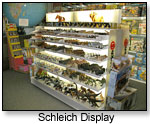 “Manufacturers do not have a clue about branding product in their stores,” he told TDmonthly Magazine. “We are trying to brand sections. Corolle Dolls just did a boutique in my store as a test. It looks stunning, and it’s increased our Corolle business by 25 percent since they put it in in August. Schleich just put in a beautifully done displayer [Oct. 27], and that business has gone up 40 percent. … Sales changed immediately.”
“Manufacturers do not have a clue about branding product in their stores,” he told TDmonthly Magazine. “We are trying to brand sections. Corolle Dolls just did a boutique in my store as a test. It looks stunning, and it’s increased our Corolle business by 25 percent since they put it in in August. Schleich just put in a beautifully done displayer [Oct. 27], and that business has gone up 40 percent. … Sales changed immediately.” 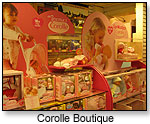 “Quite frankly, with all the respect that I have for the other players in industry, the reps don’t understand it either,” he lamented. “When you ask them for collateral material, they don’t have any, and my response today is, ‘Then how do you expect me to sell your product to your customer?’ It’s not enough to put in on the shelf anymore.”
“Quite frankly, with all the respect that I have for the other players in industry, the reps don’t understand it either,” he lamented. “When you ask them for collateral material, they don’t have any, and my response today is, ‘Then how do you expect me to sell your product to your customer?’ It’s not enough to put in on the shelf anymore.”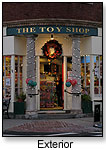 FROM VENDOR TO RETAILER
FROM VENDOR TO RETAILER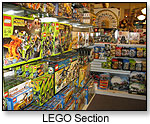 “The challenge was to pay the debt down, and to make a family living and move the business forward to some level,” Hesel said. “The way I did the cash flow before I bought it was on a three-year plan, and I had to get to that new sales level for the whole thing to work. We did it, but it was kind of scary at the time.”
“The challenge was to pay the debt down, and to make a family living and move the business forward to some level,” Hesel said. “The way I did the cash flow before I bought it was on a three-year plan, and I had to get to that new sales level for the whole thing to work. We did it, but it was kind of scary at the time.”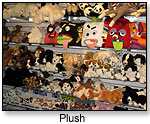 “We’ve been here for 70 years, almost, and we’re an institution. So you have a tendency to get lazy. … I just changed my point-of-sale system this summer. I should have changed it 10 years ago,” he told TDmonthly. “Suddenly, now that we’ve changed, we’re getting much more information, and it’s much better for us in the long run. … [We’re able] to see instant trends in sales of products. While Bananagrams is very popular, we were able to sell 750 of them by responding to an upward sales trend.”
“We’ve been here for 70 years, almost, and we’re an institution. So you have a tendency to get lazy. … I just changed my point-of-sale system this summer. I should have changed it 10 years ago,” he told TDmonthly. “Suddenly, now that we’ve changed, we’re getting much more information, and it’s much better for us in the long run. … [We’re able] to see instant trends in sales of products. While Bananagrams is very popular, we were able to sell 750 of them by responding to an upward sales trend.”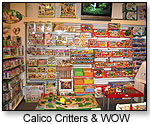 “When you switch a customer and change their shopping habits, you’d better know how to keep them, and that means being right with them all the time, even if you think they’re wrong,” he said. “It’s very hard to get their loyalty, and it’s really easy to lose their loyalty.”
“When you switch a customer and change their shopping habits, you’d better know how to keep them, and that means being right with them all the time, even if you think they’re wrong,” he said. “It’s very hard to get their loyalty, and it’s really easy to lose their loyalty.”
Copyright © 2025 TDmonthly®, a division of TOYDIRECTORY.com®,
Inc.